Seven: The Days Long Gone, is at first glance, an unassuming game. It has a silly name, but it otherwise looks like a solid CRPG. Behind its simple facade are its developers – IMGN.PRO, responsible for the excellent horror game Kholat, and Fool’s Theory – a new company (mostly) made up of former CD Project Red vets. You may better know them as the folks behind The Witcher series. Don’t let this pedigree fool you – Seven comes nowhere near The Witcher in terms of being either a seminal work of art, or as a game, no matter how hard it tries.
Developer: IMGN.PRO, Fool’s Theory
Publisher: IMGN.PRO
Formats: PC
Released: December 1, 2017
Price: $29.99
Copy Provided by Publisher
Losing the Plot
Seven sets itself up as a sci-fi dystopian thriller but also as a grim post-apocalyptic story of survival. It’s a good idea, reminiscent of Horizon Zero Dawn from earlier this year. There’s a destructive force that wiped out most of humanity (in this case it’s the generic “daemons”), and those that remained formed little civilizations throughout the world using futuristic technology to cut back this scourge. Eventually one man arose and promised to take the remnants of humanity to a new world beyond the stars.
Cinematics don’t convey this story, and certain not the gameplay. Instead, it’s spat out at you via a lengthy PowerPoint presentation. It goes deep into politics and world building, throwing several vague terms at you without letting you stop and examine what the world has become or why you should care.
The Technomagi control the prison island of Peh in the world of Vendral and a daemon lives in your head called Artanak and there’s the techrot you need to watch out for, but the biggest threat are the tinnies.
After this ends, you’re dumped into the shoes of Teriel, a thief and former member of the Thieves Guild before getting kicked out for being too much of a rebel. I half-expected Teriel’s friend at the start of the game to un-ironically call him a loose cannon, yelling at him with a red face and a cigar sticking out of his mouth.
This is a cliché heavy story, using every well-trodden science fiction trope it can think of. We never learn much about Teriel as the game is more interested in world building than character development. What we do learn of him is that he’s a thief, he has no interest in politics, or much of anything but himself, and he likes money. All the other character you run into are much the same way, all stereotypes cut from the same cloth: unlikable assholes.
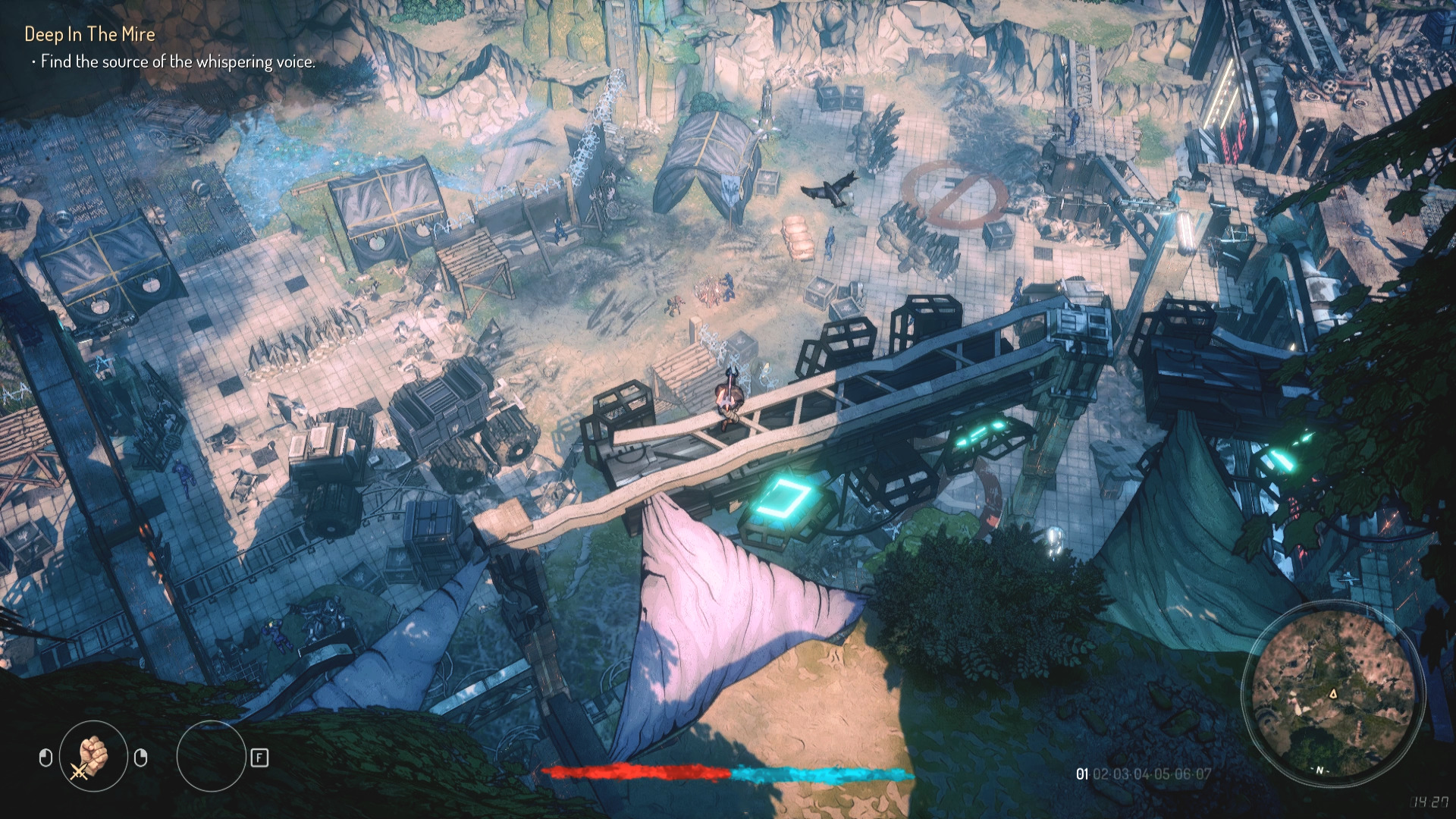 But the clichés don’t end there. The game makes a big deal about how you’re a thief and how Teriel is a tough guy who doesn’t play by the rules, but immediately pulls the “bungled job that was actually a set up by powerful figure as a test all along!” trope. From there you can also see the plot go down the sci-fi dystopia trope checklist as you’re saddled with a partner you don’t want, given an overly elaborate mission that goes wrong at every turn, and you’re just sitting there for the ride.
But the clichés don’t end there. The game makes a big deal about how you’re a thief and how Teriel is a tough guy who doesn’t play by the rules, but immediately pulls the “bungled job that was actually a set up by powerful figure as a test all along!” trope. From there you can also see the plot go down the sci-fi dystopia trope checklist as you’re saddled with a partner you don’t want, given an overly elaborate mission that goes wrong at every turn, and you’re just sitting there for the ride.
A clichéd story could still be great, if presented well. There’s nothing remotely original about The Last of Us but it’s regarded as one of the best written games ever made. Even other games of this genre are great examples, like Deus Ex or the recent Pillars of Eternity, but Seven: The Days Long Gone is a hackneyed bore that tries to emulates the greats of the genre and comes up empty precisely because it has nothing new or even interesting to say for itself.
Sheer Nonsense
It doesn’t help that a lot of the story comprises of nonsensical terminology and concepts you’d expect from a high fantasy game. The Technomagi control the prison island of Peh in the world of Vendral and a daemon lives in your head called Artanak and there’s the techrot you need to watch out for, but the biggest threat are the tinnies. It’s hard to understand what people are talking about as none of the lore behind these concepts get any explanation. Seven simply assumes you’ll understand what all these are and how they relate to one another. This is the kind of writing that’s often confused for brilliant subtlety and world building, but none of it means anything. It’s just lazy attempts at making the world feel grander than it is.
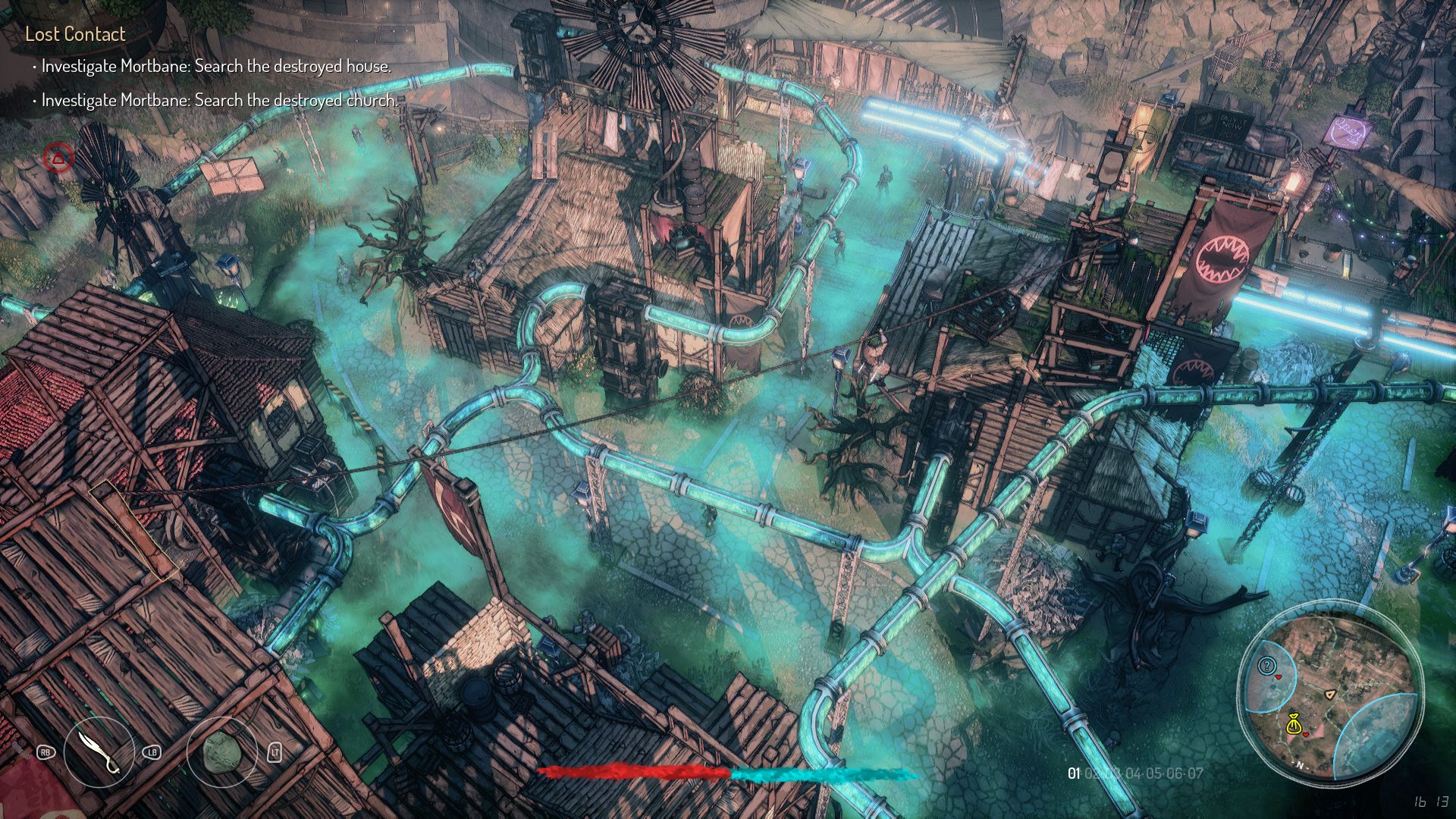 Seven is also desperate to be “dark and edgey,” putting no thought into how to make that work, again, almost as if it were copying other games in the genre. Teriel is your standard tough guy, uncaring protagonist, but he never warms up or becomes more interesting. Every character you meet is a terrible person, there’s a disease killing people that everyone is talking about, but no one’s doing anything about it. There’s senseless crime committed in the streets and the guards in this prison don’t care. If they’re going to go the route of guards not caring about what the criminals do, then why are they even there?
Seven is also desperate to be “dark and edgey,” putting no thought into how to make that work, again, almost as if it were copying other games in the genre. Teriel is your standard tough guy, uncaring protagonist, but he never warms up or becomes more interesting. Every character you meet is a terrible person, there’s a disease killing people that everyone is talking about, but no one’s doing anything about it. There’s senseless crime committed in the streets and the guards in this prison don’t care. If they’re going to go the route of guards not caring about what the criminals do, then why are they even there?
Speaking of which, early on you’ll run into a slave auction. Again, Peh is a prison, so who are these slaves, where did they come from, and who’s buying them? Are the slaves other prisoners? Is it other prisoners buying these slaves? Are the slave masters also prisoners, or are they from regular society? Why are slaves being sold in a prison to prisoners and not to societal elites? Do the guards not care? Why do they care so much about crime that they have public executions and had to dedicate an entire island to being a prison, yet don’t mind slave auctions happening in the open?
The stealth mechanics don’t seem to work most of the time.
It reeks of a narrative that had no thought put into how its various elements fit together, or whether or not they even do fit. Seven: The Days Long Gone, even down to its title, feels like a game that’s trying above all else to be mature without knowing how to actually be mature.
Hidden in Plain Shite
One way Seven seeks to differentiate itself is through its gameplay. Rather than being a traditional turn-based CRPG, it is instead a real-time stealth, free roam RPG. You play as a thief, so it makes sense that stealth and parkour would play a big role in the gameplay. It’s clear the developers stopped there and thought that concept alone would carry the day.
The stealth mechanics don’t seem to work most of the time. You can hide in bushes and behind objects, but there’s no “sticking” to cover like you’d find in Metal Gear or hiding in the shadows like in Splinter Cell. Because of this, you’re never certain if what you’re hiding behind works as cover or not. Sometimes it does, sometimes it just doesn’t. And it’s bizarrely difficult to get into stealth mode in this supposed stealth game.
You have to press a button to crouch, which is the only way you can sneak, and you automatically exit out of your crouch whenever you climb up something, jump, initiate a stealth kill, or when interacting with certain objects. Often you’ll get spotted because Teriel decided he didn’t particularly feel like crouching sometimes.
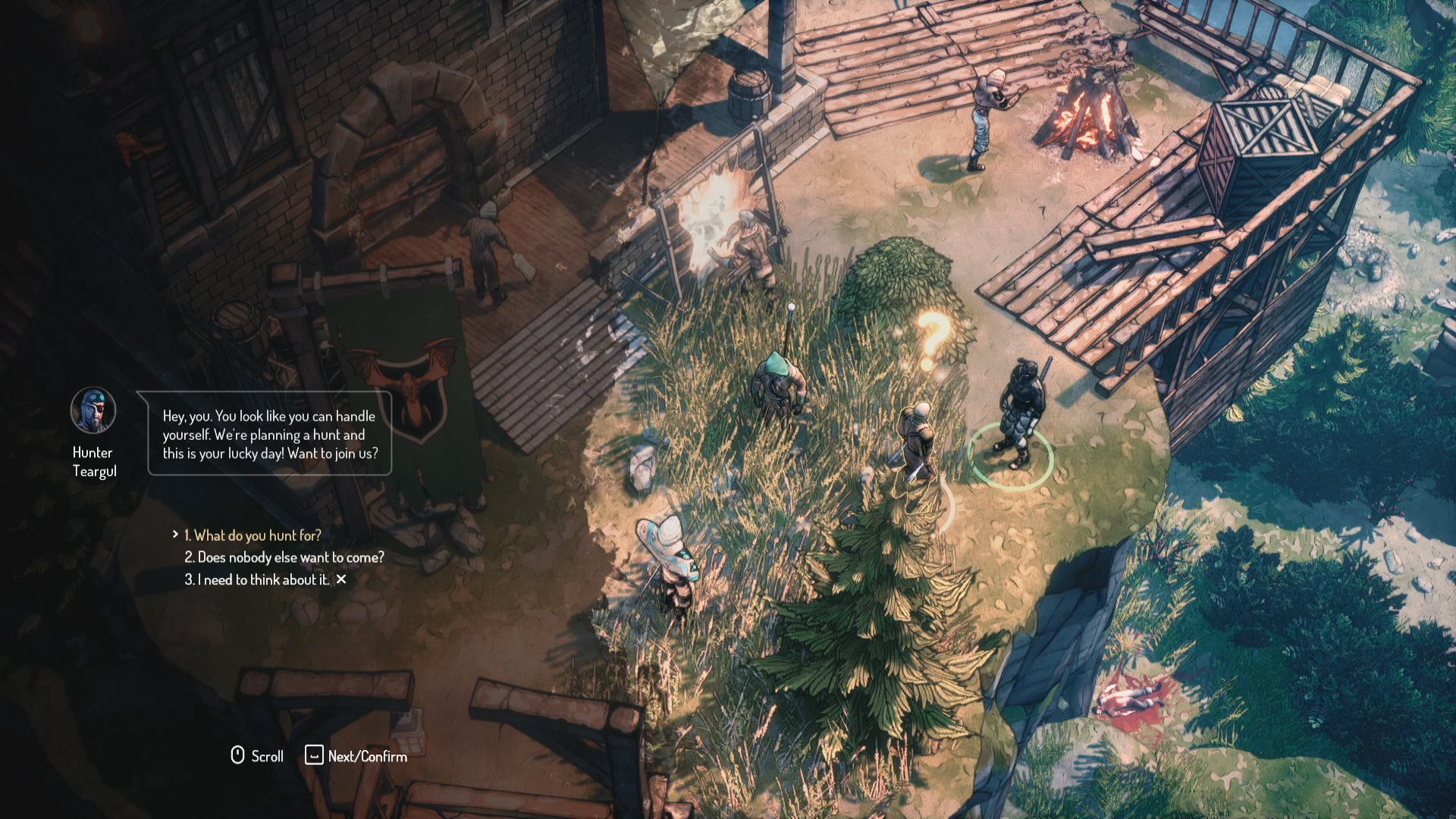 Seven uses a top-down camera. You can spin the camera around on its axis and zoom in and out, but you can’t change the angle itself. This makes it impossible to see the faster moving enemies. To counter this though, enemy AI is generally awful. They have such low perception that you can get surprisingly close to them before they see you, and can get up close behind them as quickly as you like and take them out before they ever even think about turning around. In almost every instance it’s easier and quicker to run around and not bother sneaking.
Seven uses a top-down camera. You can spin the camera around on its axis and zoom in and out, but you can’t change the angle itself. This makes it impossible to see the faster moving enemies. To counter this though, enemy AI is generally awful. They have such low perception that you can get surprisingly close to them before they see you, and can get up close behind them as quickly as you like and take them out before they ever even think about turning around. In almost every instance it’s easier and quicker to run around and not bother sneaking.
It never feels like Seven is forcing you towards anything.
As a result, you’ll often find the stealth has no middle ground – you’re either 100% hidden or you’re spotted. There isn’t much of a “caution” phase where enemies are suspicious or are searching the area for you. Once you do get spotted, it is far too easy to run away, lose your pursuers, and they’ll go right back to their regular patrol pattern.
Not that it matters much anyway, because if you do somehow screw up, you can save and load at any time, making the stealth totally inconsequential anyway.
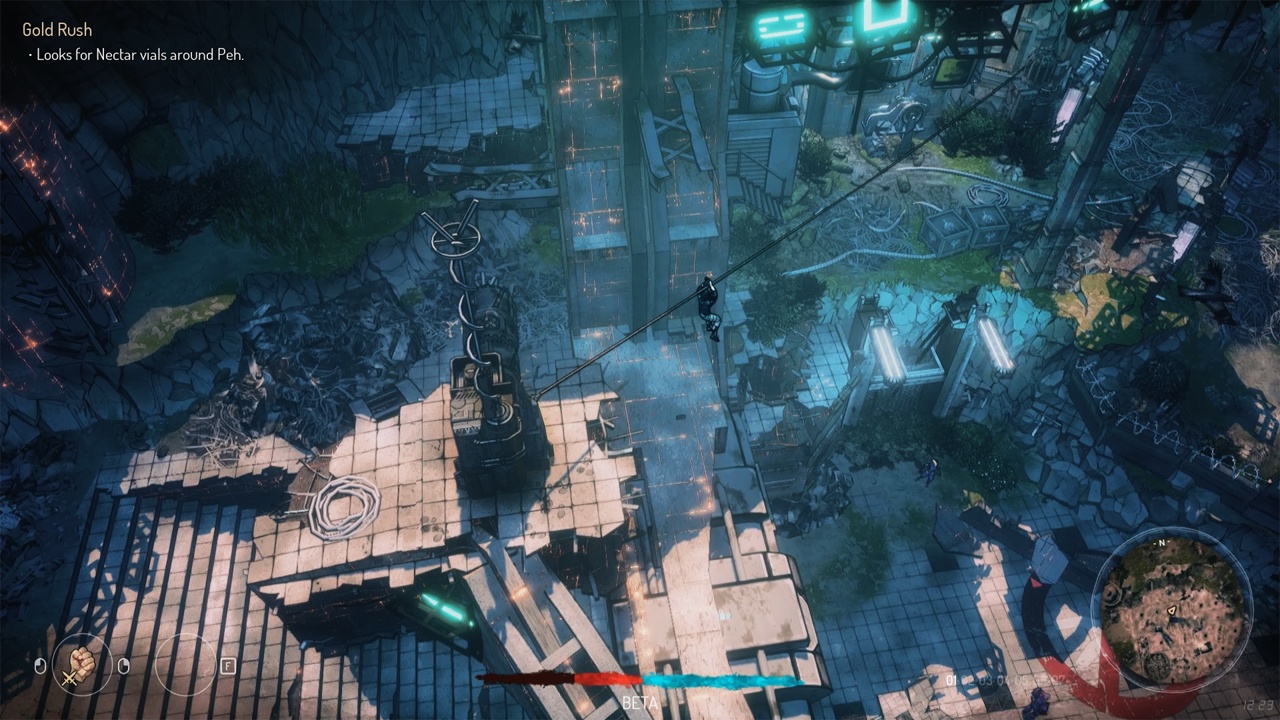 If you are detected, there is combat. It’s not generally recommended, partly because you’re not much of a fighter, and partly because the combat is dull at best, and an untenable disaster at worst. You can clear out most basic enemies by using your standard attack and gear you find at the start of the game, assuming you can get a bead on anybody. You can lock on to targets, but most of the time they’ll dodge at the last second or you’ll just miss, so both you and your enemies are desperately flailing around trying and failing to make contact with each other.
If you are detected, there is combat. It’s not generally recommended, partly because you’re not much of a fighter, and partly because the combat is dull at best, and an untenable disaster at worst. You can clear out most basic enemies by using your standard attack and gear you find at the start of the game, assuming you can get a bead on anybody. You can lock on to targets, but most of the time they’ll dodge at the last second or you’ll just miss, so both you and your enemies are desperately flailing around trying and failing to make contact with each other.
Bugs & Broken Design
On top of its myriad of problems, Seven is also buggy, or at least seems like it. It can be as small as a hint on a loading screen spoiling a plot point, or as big as Teriel getting glued to the floor and the controls freezing when you try to throw a grenade.
There’s something called “Sense Mode” that’s used to discover intractable objects, follow wires to disable security cameras, and detect enemies. Theoretically this helps guide you away from enemies and towards objects of interest, but it too feels buggy, whether it really is or not.
This mode controls with a third person camera, but there’s no way to rotate the camera. Whatever angle it was at when you engaged this mode is where it’s stuck, hiding enemies and wires behind walls and other objects. You have to constantly go in and out of sense mode just to rotate the camera, follow a wire or enemy to where it disappears behind a wall again, go back out of Sense mode, spin the camera, then go back in. It’s a needlessly fiddly system that makes using this mode a chore, and you won’t ever use it unless you absolutely must.
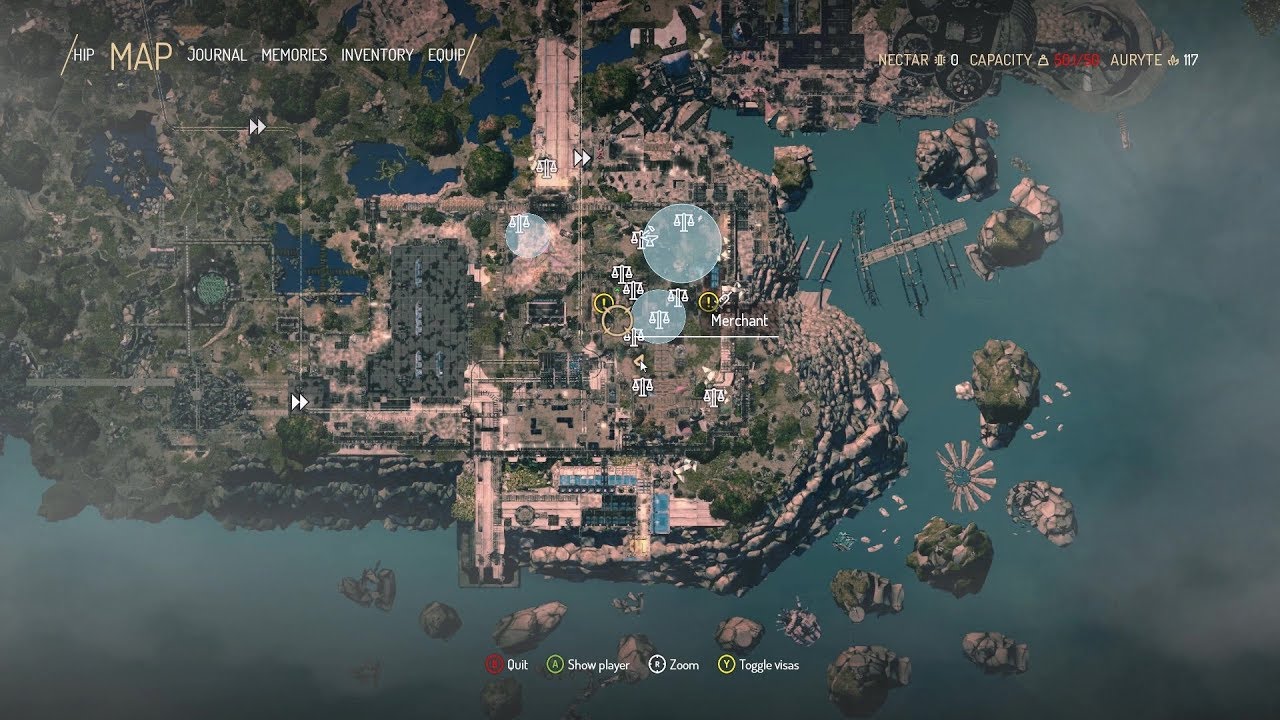 Another mechanic of questionable use is the map. It’s far too vague to be useful. Almost all the areas in the game have multiple levels and floors, but the map doesn’t tell you what level your objective is on. You can’t even use the markers to indicate a general direction, as they often feel like they’re several hundred feet away from where they are in the world.
Another mechanic of questionable use is the map. It’s far too vague to be useful. Almost all the areas in the game have multiple levels and floors, but the map doesn’t tell you what level your objective is on. You can’t even use the markers to indicate a general direction, as they often feel like they’re several hundred feet away from where they are in the world.
What the Game Does Right
The parkour system is well-implemented at least. This is an open world game, and each area is big and sprawling, allowing for plenty of paths to tackle your objective or to just get around. That turns out to be a big deal.
It’s just doing what everybody else in the genre’s doing, only not as good.
Peh (yes, that’s really what it’s called) is split up into different zones, and you have to collect visas to access different areas. You’d think the game would be super restrictive because of this, and in some ways it is, but you are allowed to break those restrictions. For a start, you don’t gain XP as you traditionally would by completing quests and defeating enemies. Instead, you improve your stats by collecting skill chips, which can be freely collected at set points throughout the world, encouraging you to explore. You can also pick up visa’s by exploring too. However, you can circumvent these visa’s and even the difficulty curve by using your thieving skills to sneak into and out of other zones.
It never feels like Seven is forcing you towards anything. You can do anything at any time, whether you’re leveled up enough, whether you have the right equipment, or whether you’re overpowered. It’s easy to stumble into side quests that are massively above your level, but you can still try them if you want.
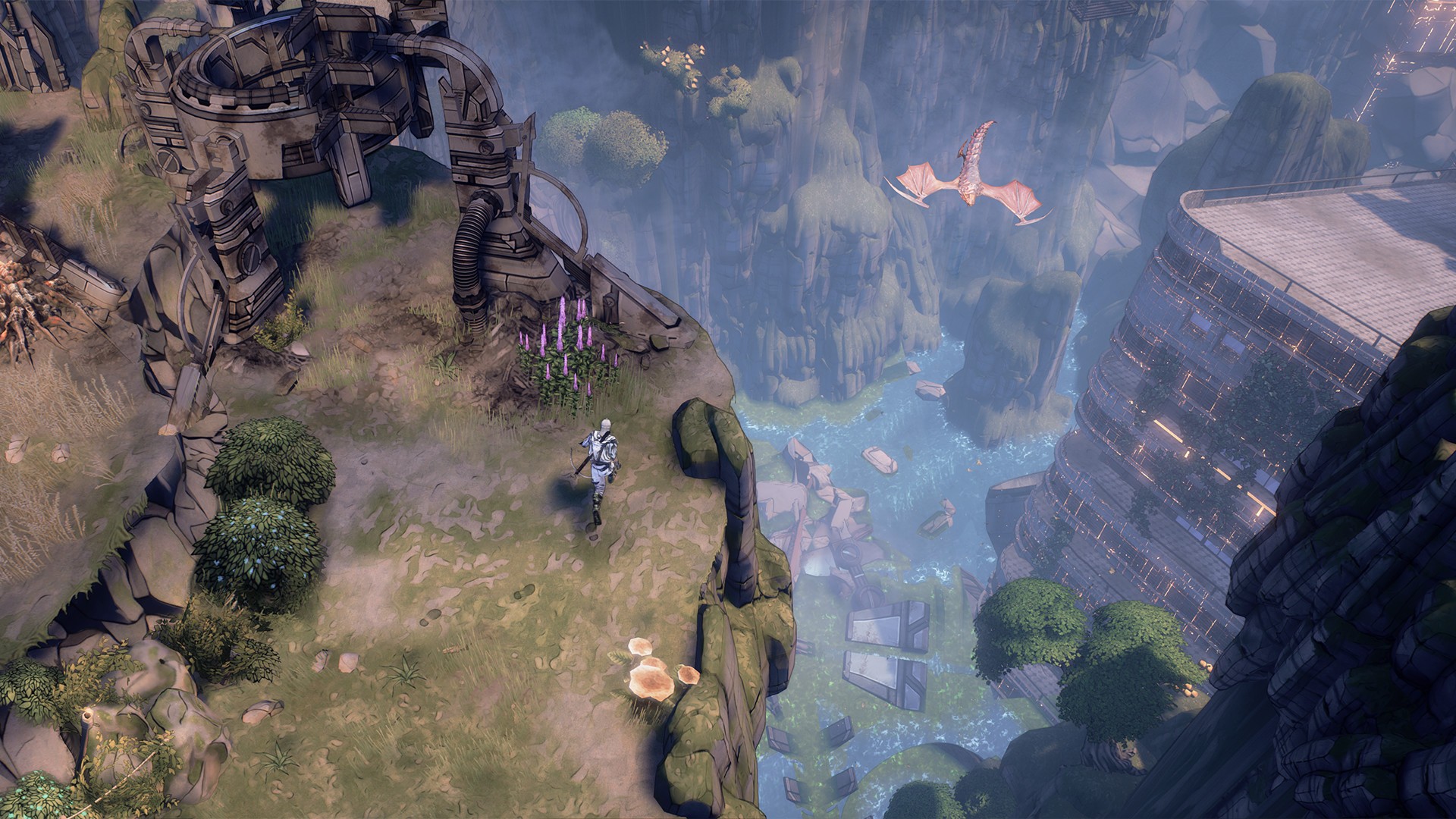 However, because quests don’t reward you with XP, you never feel the need to do any side quests. The story and characters are all dull, so you won’t be compelled to see what happens next either. And since you can complete the game with basic equipment, assuming you find enough skill chips, you’re not going to worry about gathering loot either. It’s kind of amazing how desperately the game wants you to explore its world and characters, yet undermines itself at every turn.
However, because quests don’t reward you with XP, you never feel the need to do any side quests. The story and characters are all dull, so you won’t be compelled to see what happens next either. And since you can complete the game with basic equipment, assuming you find enough skill chips, you’re not going to worry about gathering loot either. It’s kind of amazing how desperately the game wants you to explore its world and characters, yet undermines itself at every turn.
Pros:
- Decent voice acting gives the characters at least a modicum of personality.
- It uses its grim art style effectively, giving just enough color to not make it too drab.
- The level design puts the parkour system to good use.
Cons:
- Cliché riddled story that’s too invested in its own sense of grandeur without earning it.
- It’s often hard to tell what’s going on in the plot.
- Bland, lifeless characters.
- The stealth gameplay doesn’t work, and the combat is awful.
- You never feel the need to explore this world as there’s no story or gameplay reward.
- Buggy, with a useless map system and annoying “Sense Mode.”
- The top down camera makes no sense for this kind of gameplay.
Conclusion
The only thing Seven: The Days Long Gone has going for it is the real time stealth gameplay, a rarity in a CRPG, and its emphasis on player choice and freedom. It bungles both of them so thoroughly none of it matters. Even then, it still doesn’t feel like the game is trying anything new, or put a twist on classic tropes. It’s just doing what everybody else in the genre’s doing, only not as good.
This is the kind of game that’ll be called a classic by people who have never played Shadowrun Hong Kong, System Shock 2, Fallout: New Vegas, or even Dex. It trades in clichéd story beats and awful gameplay, and isn’t worth your time.
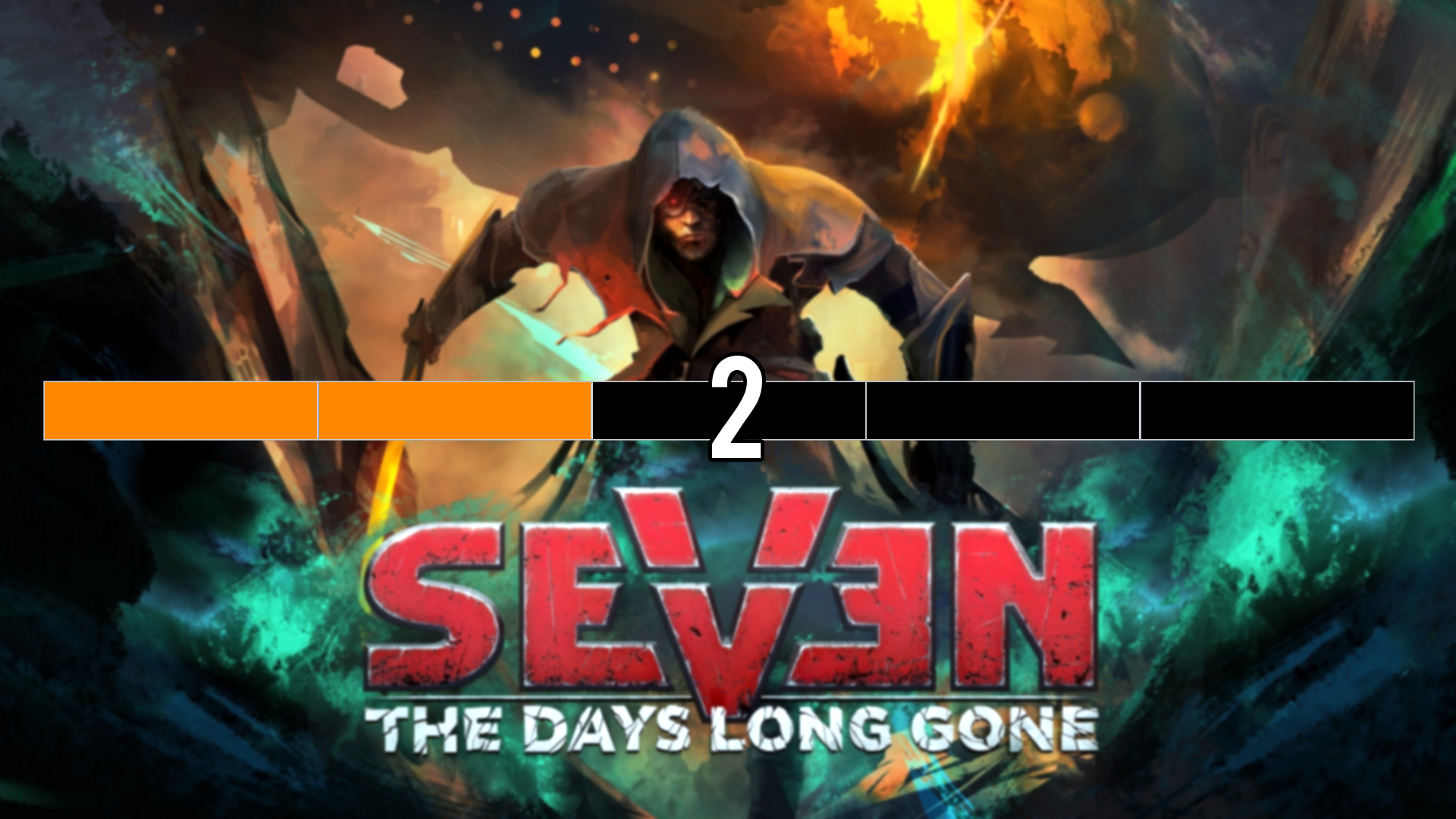




Unfair review IMHO. Game is buggy and janky as hell but a lot of love obviously went into it. I am enjoying it.